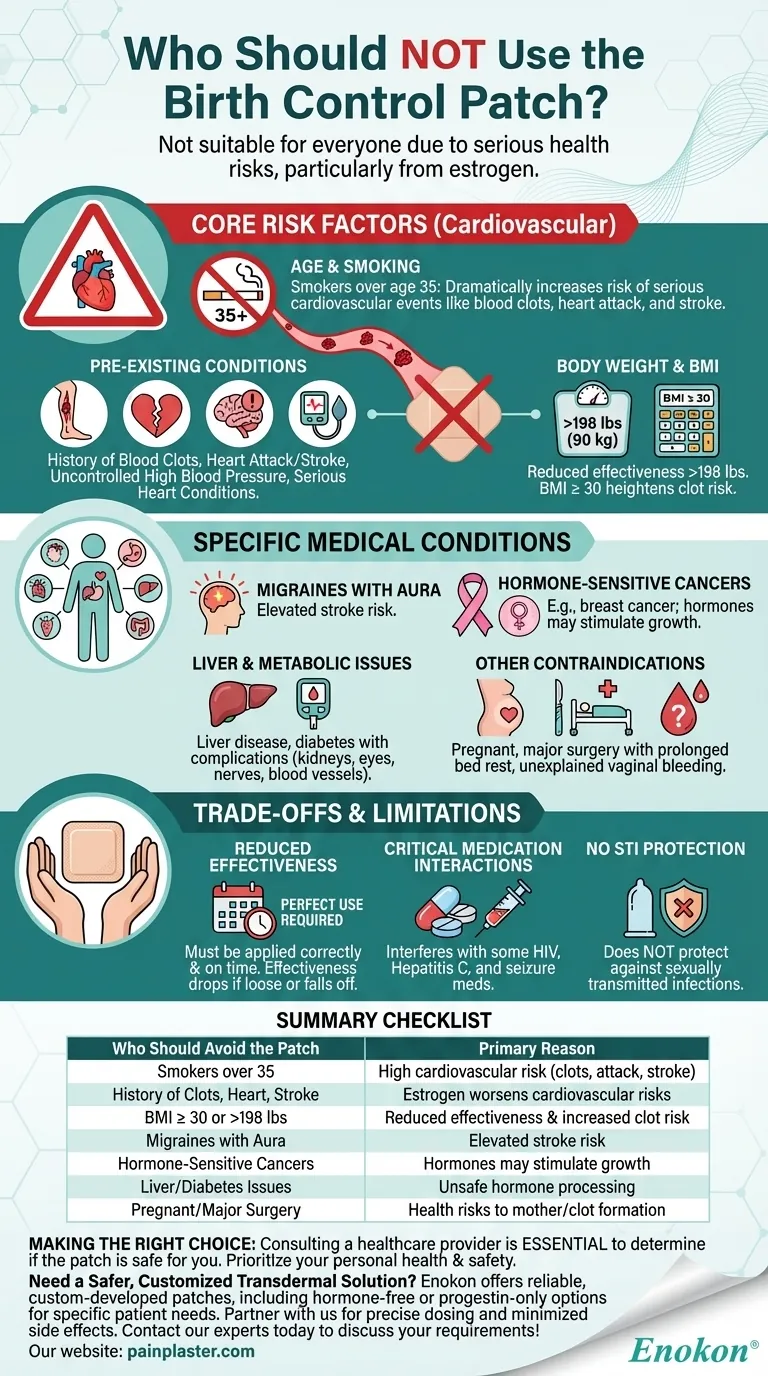To be clear, the birth control patch is not a safe or suitable option for everyone. It is specifically contraindicated for individuals with certain health profiles, most notably smokers over the age of 35, those with a history of blood clots, heart attack, or stroke, and individuals with a Body Mass Index (BMI) of 30 or higher due to increased health risks and potentially reduced effectiveness.
The decision to use the birth control patch hinges on a careful evaluation of your personal health history. The key contraindications are linked to the estrogen in the patch, which can elevate the risk of serious cardiovascular events like blood clots, particularly when combined with other risk factors like age, smoking, or a high BMI.

Understanding the Core Risk Factors
The most serious warnings against using the patch are related to cardiovascular health. The hormones delivered by the patch can affect your circulatory system, and certain pre-existing factors can amplify this risk significantly.
The Impact of Age and Smoking
Combining smoking and being age 35 or older dramatically increases your risk of serious cardiovascular side effects, such as blood clots, heart attacks, and strokes. The patch is strongly advised against for anyone who fits this profile.
Pre-existing Cardiovascular Conditions
A personal history of certain health events is a major red flag. You should not use the patch if you have a history of:
- Blood clots (e.g., deep vein thrombosis or pulmonary embolism)
- Heart attack or stroke
- Uncontrolled high blood pressure
- Other serious heart conditions
The estrogen in the patch can place additional strain on a compromised cardiovascular system.
The Role of Body Weight and BMI
The patch has two key limitations related to weight. First, its effectiveness may be reduced in individuals who weigh more than 198 pounds (90 kg).
Second, a BMI of 30 or greater is considered a contraindication. This is because a higher BMI is an independent risk factor for blood clots, and adding a hormonal contraceptive can heighten that risk.
Specific Medical Conditions to Consider
Beyond cardiovascular health, other conditions can interact poorly with the hormones in the birth control patch. A thorough discussion with your doctor is essential if you have any of the following.
Migraines with Aura
If you experience migraines with aura (headaches accompanied by visual disturbances like flashing lights), you should not use the patch. This specific type of migraine is associated with an increased risk of stroke, which can be further elevated by combined hormonal contraceptives.
History of Certain Cancers
The patch is not recommended for individuals with a history of certain hormone-sensitive cancers, such as breast cancer. The hormones in the patch could potentially stimulate the growth of cancer cells.
Liver and Metabolic Issues
Because the liver is responsible for processing hormones, existing liver disease is a contraindication. Likewise, diabetes with complications affecting your kidneys, eyes, nerves, or blood vessels makes the patch an unsuitable option.
Other Important Contraindications
You should also avoid the patch if you:
- Are pregnant or suspect you might be.
- Are about to undergo major surgery that will require prolonged bed rest.
- Have unexplained vaginal bleeding, which needs to be diagnosed first.
Understanding the Trade-offs and Limitations
Even for suitable candidates, it's crucial to be aware of potential issues that can affect the patch's performance and safety.
Reduced Effectiveness
Aside from the weight limit, the patch's effectiveness depends on perfect use. It must be applied to clean, dry skin on the same day each week. If the patch becomes loose or falls off, its contraceptive protection can be compromised.
Critical Medication Interactions
Certain medications can interfere with the hormones in the patch, making it less effective. This includes some drugs used to treat HIV, Hepatitis C, and seizures. Always disclose all medications and supplements you are taking to your healthcare provider.
No Protection Against STIs
It is essential to remember that the birth control patch offers no protection against sexually transmitted infections (STIs). A barrier method, like a condom, is still required to reduce your risk of contracting an STI.
Making the Right Choice for Your Health
Consulting with a healthcare provider is the only way to determine if the patch is a safe and effective option for your specific circumstances.
- If you are over 35 and smoke: The patch is not a safe option, and you must explore non-hormonal or progestin-only birth control methods.
- If you have a BMI over 30 or weigh over 198 lbs: You should discuss the dual risks of reduced effectiveness and increased clot formation with your doctor to find a more reliable alternative.
- If you have a history of blood clots, heart issues, or stroke: Combined hormonal methods like the patch are generally contraindicated due to the significant risk they pose.
- If you manage other health conditions like migraines with aura: A detailed medical consultation is critical to weigh the risks and benefits of any hormonal contraceptive.
Ultimately, your choice of contraception must prioritize your personal health and safety above all else.
Summary Table:
| Who Should Avoid the Patch | Primary Reason |
|---|---|
| Smokers over age 35 | High risk of blood clots, heart attack, or stroke |
| History of blood clots, heart attack, or stroke | Estrogen can worsen cardiovascular risks |
| BMI ≥ 30 or weight > 198 lbs (90 kg) | Reduced effectiveness & increased clot risk |
| Migraines with aura | Elevated stroke risk |
| History of hormone-sensitive cancers (e.g., breast cancer) | Hormones may stimulate cancer growth |
| Liver disease or diabetes with complications | Body cannot safely process hormones |
| Pregnant or post-surgery with bed rest | Health risks to mother or clot formation |
Need a Safer, Customized Transdermal Solution?
If the birth control patch isn't right for your health profile, Enokon offers reliable, custom-developed transdermal patches for pharmaceutical and healthcare brands. We specialize in creating safe, effective alternatives tailored to specific patient needs, including hormone-free or progestin-only options.
Partner with us to:
- Develop transdermal patches with precise dosing and minimized side effects.
- Leverage our technical expertise for custom R&D, ensuring compliance and safety.
- Access bulk manufacturing of high-quality, dermatologically-tested pain plasters and medical patches.
Let's create a safer solution for your patients. Contact our experts today to discuss your requirements!
Visual Guide

Related Products
- Menthol Gel Pain Relief Patch
- Lidocaine Hydrogel Pain Relief Patch for Pain Relief
- Far Infrared Deep Heat Relief Patches Medicated Pain Relief Patches
- Prostate Pain Kidney Health Care Patch for Men
- Heat Relief Capsicum Patch for Lower Back Pain Relief
People Also Ask
- What is the primary use of a menthol patch? Targeted Relief for Muscle & Joint Pain
- What are the important warnings for using menthol topical? Safety Tips for Effective Pain Relief
- How does menthol function as a topical analgesic? The Science Behind Cooling Pain Relief
- Is menthol topical safe during pregnancy and breastfeeding? Key Safety Insights
- What are the serious side effects of menthol patch that require immediate medical attention?















